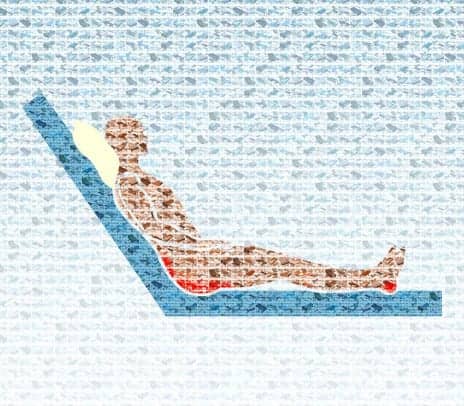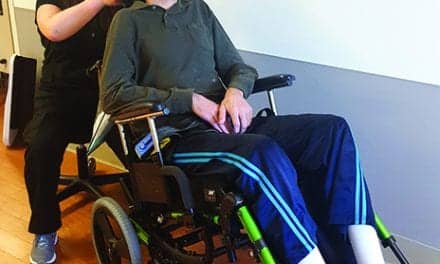
This graphic shows the pressure points created by a hospital mattress. (Image courtesy of Paul Faulks, University of Leeds)
An expensive high-tech air mattress may only be marginally better at preventing pressure sores and ulcers than a more lower-cost specialist foam mattress, according to the results of a study conducted by the University of Leeds in the United Kingdom.
Known as an alternating-pressure mattress, the high-tech device contains air pockets designed to inflate and deflate to constantly change pressure points on the skin. They cost an estimated £1,000 each (US $1,217).
In comparison, a specialist foam mattress is estimated at around £200 (US $243) and is made up of high-quality polyurethane and viscoelastic foam designed to cradle the patient to reduce pressure on the skin, according to a media release from Leeds University.
Specialist foam mattresses are in widespread use across the NHS (National Health Service). The high-tech air mattresses are found on approximately 10% of NHS hospital beds and given to patients considered to be at high risk of pressure ulcers even though there has been no independent evaluation of their effectiveness.
The UK Government’s health regulator, the National Institute of Health and Care Excellence, had called for a scientific trial to investigate the benefits of the high-tech mattresses.
That study, led by nurse researchers at the University of Leeds, is published in the journal EClinicalMedicine.
The gains from the use of the high-tech air mattresses were marginal, the researchers suggest, adding that for every 50 patients allocated to one of the high-tech air mattresses, only one would benefit from it.
According to the results, 6.9% of patients on the high-tech air mattresses developed a pressure sore that was grade two (ie blister or break in the skin) or worse compared with 8.9% on the specialist foam mattress.
The median length of time it took for the ulcers to develop for the patients on a high-tech air mattress was 18 days compared to 12 days for those on the specialist foam mattress.
The overall number of patients who developed pressure sores during the study was smaller than expected: the result, the researchers believe, of changes in nursing practice designed to reduce the burden of pressure sores, the release explains.
“The professional guidelines tell healthcare staff that they should use specialist foam for all at-risk patients and high-tech air mattresses for patients with an existing pressure ulcer when adequate pressure distribution cannot be achieved,” says Jane Nixon, Professor of Tissue Viability and Clinical Trials at the University of Leeds, who led the study.
“But in practice, some nurses provide high-risk patients as well as those with existing pressure ulcers with the high-tech air mattresses, and there has not been any evaluation of the effectiveness of one type of mattress over another.
“Some patients find the air mattress unsettling. They are kept awake by the noise of the pump, feel unsafe because the mattress is moving, or just find them uncomfortable.
“Rehabilitating patients also complain that they can’t move around themselves or get in and out of bed — and that exacerbates already limited mobility,” she adds.
Patients who agreed to take part were randomly allocated to either a high-tech air or specialized foam mattress for 2 months or until discharge, whichever came sooner. They were then assessed by a nurse for a final time 30 days after discharge. The majority of the patients were elderly, with the median age 81, and included a number of patients who were aged over 100.
The analysis suggests that the patients who benefited most from the high-tech air mattresses were those who were completely immobile, confused, had nutritional deficits and very red skin on a pressure area, the release continues.
The researchers did find an economic advantage to using the high-tech air pressure mattresses. Although they cost more to buy, the patients who were nursed on them had, on average, a slightly shorter stay in hospital, and that reduced the overall cost of care.
However, more research is needed to fully understand the correlation between mattress type and length of hospital stay.
While acknowledging that there were benefits to using the high-tech air pressure mattresses, the researchers state in the release that as the gains were small, the advice to nurses should be that most patients could be safely cared for on a specialized foam mattress.
“The outcome of this study provides the evidence that specialist foam mattresses are appropriate for most patients who are at high risk of developing pressure ulcers,” Nixon concludes.
“But staff should be free to exercise clinical discretion in provision of either mattress, informed by patient preference, comfort or rehabilitation needs as well as specific risk factors such as being completely immobile, being confused, having nutritional deficits or early signs of pressure damage.”
[Source(s): University of Leeds, EurekAlert]




